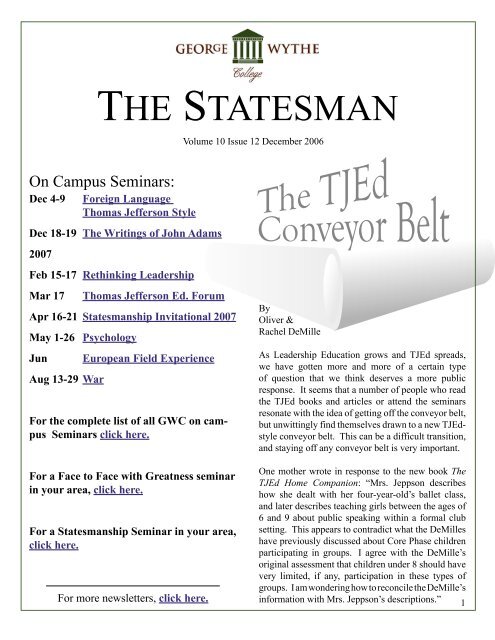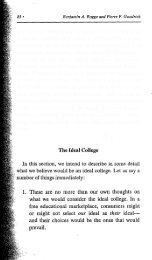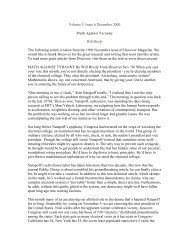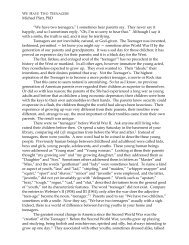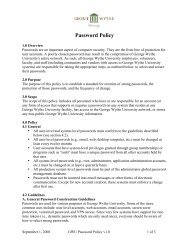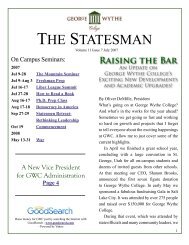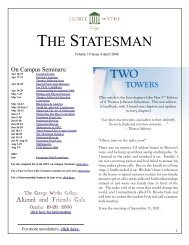THE STATESMAN - George Wythe University Newsletter
THE STATESMAN - George Wythe University Newsletter
THE STATESMAN - George Wythe University Newsletter
Create successful ePaper yourself
Turn your PDF publications into a flip-book with our unique Google optimized e-Paper software.
<strong>THE</strong> <strong>STATESMAN</strong><br />
Volume 10 Issue 12 December 2006<br />
On Campus Seminars:<br />
Dec 4-9<br />
Foreign Language<br />
Thomas Jefferson Style<br />
Dec 18-19 The Writings of John Adams<br />
2007<br />
Feb 15-17 Rethinking Leadership<br />
Mar 17<br />
Thomas Jefferson Ed. Forum<br />
Apr 16-21 Statesmanship Invitational 2007<br />
May 1-26 Psychology<br />
Jun<br />
Aug 13-29 War<br />
European Field Experience<br />
For the complete list of all GWC on campus<br />
Seminars click here.<br />
For a Face to Face with Greatness seminar<br />
in your area, click here.<br />
For a Statesmanship Seminar in your area,<br />
click here.<br />
For more newsletters, click here.<br />
By<br />
Oliver &<br />
Rachel DeMille<br />
As Leadership Education grows and TJEd spreads,<br />
we have gotten more and more of a certain type<br />
of question that we think deserves a more public<br />
response. It seems that a number of people who read<br />
the TJEd books and articles or attend the seminars<br />
resonate with the idea of getting off the conveyor belt,<br />
but unwittingly find themselves drawn to a new TJEdstyle<br />
conveyor belt. This can be a difficult transition,<br />
and staying off any conveyor belt is very important.<br />
One mother wrote in response to the new book The<br />
TJEd Home Companion: “Mrs. Jeppson describes<br />
how she dealt with her four-year-old’s ballet class,<br />
and later describes teaching girls between the ages of<br />
6 and 9 about public speaking within a formal club<br />
setting. This appears to contradict what the DeMilles<br />
have previously discussed about Core Phase children<br />
participating in groups. I agree with the DeMille’s<br />
original assessment that children under 8 should have<br />
very limited, if any, participation in these types of<br />
groups. I am wondering how to reconcile the DeMille’s<br />
information with Mrs. Jeppson’s descriptions.” 1
This may seem confusing, but back up for a minute<br />
and think about the conveyor belt vs. the leadership<br />
model. On the conveyor belt, these two items would<br />
be contradictory—you either don’t put children under<br />
8 in such clubs or you do. That’s how the conveyor<br />
belt thinks. In the leadership model, in contrast, you<br />
decide what is best for each child and you do it. In<br />
the TJEd model, parents personalize each guideline<br />
to fit the needs of each individual child. One of the<br />
reasons we were so thrilled to collaborate with Diann<br />
was because her approach differs so much from our<br />
own. And yet her commitment to the principles of<br />
leadership education is evident in her own life and in<br />
the lives of her children; we hope the same can be said<br />
of our family.<br />
Most people in our modern society naturally assume<br />
that all children should do such clubs, while the<br />
leadership model assumes that most clubs are not<br />
ideal for young children. It’s important to understand<br />
these general guidelines, and it is vital to follow them<br />
or break them when it is best for each individual child.<br />
The key is having our own expertise so that we can<br />
with confidence adhere to or ignore the guidelines,<br />
and know when to do which.<br />
There is a difference between engaging a mentor for<br />
our personal development and seeking an expert to<br />
tell us how to run our family or home. Making and<br />
keeping commitments even when it is demanding or<br />
when we don’t understand or value what the mentor is<br />
asking of us is critical in late Scholar and into Depth<br />
Phase and even beyond. It is another thing entirely<br />
to abdicate our role as decision maker for our family.<br />
No mentor worth your time would allow himself to be<br />
put in that role.<br />
A young mother told Rachel, “I keep feeling like I<br />
should sit down on the floor with my five-year-old<br />
and read him books a lot more, but that would ruin my<br />
scholar phase.”<br />
By all means, ruin your scholar phase. If that’s the right<br />
thing to do. If not, then don’t. Or read to your fiveyear-old<br />
a lot more and just slow down your scholar<br />
phase studies. One of the hardest things about getting<br />
off the conveyor belt is becoming your own expert on<br />
matters of family concern. The most basic assumption<br />
of Leadership Education is that you are the expert on<br />
your own home and the education of your children. If<br />
the right thing is to sit down and read with the toddler,<br />
do it. If you should slow down your scholar phase, do<br />
it. If you should speed up your scholar phase, do it.<br />
In short, getting off the conveyor belt means that you<br />
study the guidelines of Leadership Education and then<br />
personalize them to you and your children.<br />
One day a professional teacher called and asked,<br />
“How can I apply the 7 Keys when my district won’t<br />
let me use classics in class?” Oliver responded, “Can<br />
you copy a page from Plato or Euclid and hand it out<br />
to the class and discuss it?”<br />
“Well, yes, I can do that,” he said, “but they won’t let<br />
me get rid of the textbooks.”<br />
“Great, then supplement the textbooks with classics,”<br />
he suggested. He later told us that it works wonderfully.<br />
He includes something from a classic in every class,<br />
and the students have started reading even the<br />
textbooks differently—with more interest and much<br />
more closely. General guidelines combined with<br />
specific personalization. That’s TJEd.<br />
A mother cornered Rachel after a convention and asked<br />
if it was possible for her to do her own brand of TJEd,<br />
or if she had to use the method and books taught by<br />
the Commonwealth School in her area. When we told<br />
Tiffany Earl and Aneladee Milne, the founders of the<br />
Commonwealth School approach, they laughed. “Of<br />
course she can,” they quickly replied. Tiffany added,<br />
“She needs to do what’s best for her children.” That’s<br />
TJEd.<br />
Another group announced that they weren’t using<br />
TJEd anymore because they disagreed with something<br />
they read in an article we wrote. We asked if they were<br />
abandoning classics. The answer was “no.” Mentors?<br />
“No.” In short, they were using all the 7 Keys. They<br />
can even call it something else! That’s TJEd.<br />
Another woman told Oliver she loved most of TJEd<br />
but couldn’t keep coming to seminars because she<br />
just didn’t believe in Inspire, not Require. Further<br />
dialogue revealed that she has two autistic sons and<br />
without requirements they didn’t function well. Oliver<br />
recommended that she require, structure content as<br />
well as time, and also that she emphasize quantity<br />
2
along with quality. General guidelines combined with<br />
specific personalization. That’s TJEd.<br />
One woman visiting <strong>George</strong> <strong>Wythe</strong> College said the<br />
following about the TJEd Home Companion: “I didn’t<br />
like that in some places it just tells the reader what<br />
to do.” When she came back the next day she had<br />
changed her mind. She said, “It shows me clearly<br />
how one mother does it. That’s very helpful. It helps<br />
me do it better, though of course I’ll do lots of things<br />
differently in my home.” That’s TJEd!<br />
Right on! At first, she felt worried because she was<br />
still using conveyor-belt thinking. By the next day,<br />
she was using a leadership mindset and personalizing<br />
the general guidelines. She uses parts of it, and not<br />
others. She’s glad she learned how Diann does it and<br />
how Rachel does it, because it gave her ideas and<br />
breadth of understanding, and more clarity on the<br />
underlying principles. Leadership Education means<br />
parents personalizing the curriculum and educational<br />
methods to meet the needs of their specific children.<br />
That is the whole point of getting off the conveyor<br />
belt.<br />
is this: Leadership education must have a leader at the<br />
helm. There is a double entendre here—the facilitator<br />
(be that parent or teacher) must be a leader pursuing<br />
self-education so that the student or child will be a<br />
leader pursuing self-education<br />
So, Leadership Education means personalizing for<br />
yourself or your student, to help that student get the<br />
best education possible. Since most of us are used to<br />
conveyor belt thinking, this shift in mindset can be<br />
hard to get used to. But it’s essential to getting off the<br />
conveyor belt. The general guidelines are incredibly<br />
important and one strays far from them with some risk<br />
involved; but they are still just guidelines. Leadership<br />
Education requires us to pay the price to receive<br />
inspiration in order to personalize whatever is needed<br />
to help each student get the ideal education for them.<br />
That’s TJEd!<br />
For more newsletters, click here.<br />
A charter school administrator came to Oliver concerned<br />
that the parents really hated the idea of classics and<br />
that she was losing valuable recruits. “Can you just<br />
train your teachers deeply in the classics and apply<br />
the other 6 Keys?” Oliver asked. She implemented it,<br />
and it worked! Over time the parents even got excited<br />
about the classics.<br />
One parent couldn’t believe we’d recommend Saxon<br />
math, another questioned why we would suggest the<br />
E.D. Hirsch series, and another wondered why we<br />
liked Montessori. We recommend that parents and<br />
teachers consider any book, program, seminar or<br />
curriculum that interests them and learn from them,<br />
and then apply what will work with their students or<br />
in their home. That’s what it means to really get off<br />
the conveyor belt: to become the expert on your home<br />
or classroom.<br />
TJEd means general guidelines and principles (the<br />
7 Keys, 4 Phases, scholar contracts, etc.) combined<br />
with specific personalization for each student. If it<br />
becomes just another conveyor belt, the key element<br />
in the whole process is lost. That element, put simply,<br />
3


